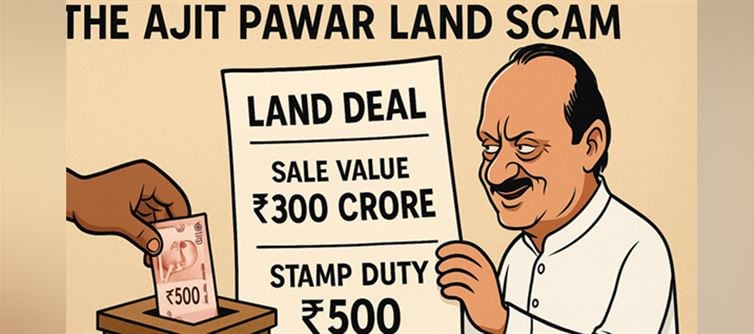
The Heist Disguised as a Deal
It’s the kind of story that should shake a democracy.
A 40-acre government plot in Pune, worth ₹1,800 crore, was allegedly sold to Ajit Pawar’s son Parth Pawar’s company for just ₹300 crore — one-sixth of its real value.
But the corruption doesn’t stop there.
The stamp duty paid for this mammoth transaction? Just ₹500.
Yes, ₹500 — the price of a decent dinner for two — for a land parcel that could have changed the lives of thousands if used right.
This isn’t a scam. This is institutional daylight robbery.
When Land Becomes Loot
The land in question wasn’t even supposed to be on the market.
It was government land, with clear restrictions on private sale and transfer. Yet somehow, Amadea Enterprises LLP, where Parth Pawar holds a 99% share, found its way into the deal — with the blessings, silence, or complicity of those meant to guard public property.
This is the classic blueprint of indian corruption — public land quietly transferred to private hands under the guise of “legitimate business,” valuations magically slashed, and documents sanitized with bureaucratic precision.
Corruption, the Family Business
The name Pawar is synonymous with maharashtra politics — and increasingly, with controversy.
Ajit Pawar has faced multiple corruption allegations in the past — from irrigation scams to cooperative bank irregularities.
Now, his son’s name surfaces in this ₹1,800 crore land scam — and yet, in a twist that defies logic and law, Parth Pawar’s name is missing from the FIR.
How does someone with a 99% ownership in the company at the center of the deal escape even being mentioned in the complaint?
That’s not investigation — that’s protection.
The Great indian Stamp Duty Miracle
₹500 stamp duty for a transaction worth ₹300 crore is not an error.
It’s a statement that the system isn’t broken; it’s designed this way.
Every official in that chain knew the value. Every officer involved understood the magnitude. And yet, it went through. Because in india, the machinery of governance often doesn’t work for the people — it works around them.
When accountability becomes optional, corruption becomes policy.
The Scam Behind the Scam
Yes, the transaction was “cancelled” after public outrage. But cancellation is not accountability.
It’s damage control.
The real question isn’t whether the deal stands — it’s how it was approved in the first place.
Who valued the land at ₹300 crore?
Who authorized the transaction?
Who looked away while ₹1,500 crore of public wealth was being siphoned under their watch?
If these questions aren’t answered, the scam hasn’t been stopped — it’s just been paused.
The Chakravyuh of Corruption
In india, corruption isn’t a crime. It’s a curriculum.
There are expert Arjuns — those who master the system, use every loophole, and walk away with thousands of crores.
And there are Abhimanyus — the small-time crooks, middlemen, or bureaucrats who get caught, scapegoated, and shamed.
The Parth Pawar case is a perfect example.
The powerful never get trapped inside the Chakravyuh.
They design it.
A Crisis of Trust
Every time a scam like this erupts, it costs more than money.
It erodes public trust — the invisible currency that holds democracy together.
When people see the rich and powerful bend laws like wire, it tells them that honesty is for fools.
The real loss isn’t ₹1,800 crore — it’s faith in governance itself.
How to Break the Cycle
This scandal should be a turning point — not another headline that fades in two days.
We need a systemic overhaul in how public land deals are handled:
Independent valuation boards must determine land prices, not bureaucrats under political pressure.
Mandatory public disclosure of every government land transaction above ₹10 crore.
Automatic cbi review for any deal where the sale value is less than 75% of the circle rate.
Criminal liability for all officials who approved undervalued or illegal transactions.
When sunlight becomes the policy, shadows disappear.
Final Word: The Price of Silence
Every scam in india starts with a signature and survives with silence.
As long as the powerful know they can walk away untouched, they will keep selling public land like personal property.
Today, it’s a 40-acre plot in Pune.
Tomorrow, it’ll be your city’s open spaces, your parks, your forests.
This isn’t about ajit pawar or Parth Pawar anymore.
It’s about the citizens’ right to not be looted by their own government.
Until we treat corruption as treason, not a “controversy,”
India will keep producing more Arjuns who master the Chakravyuh — and more Abhimanyus who die inside it.




 click and follow Indiaherald WhatsApp channel
click and follow Indiaherald WhatsApp channel